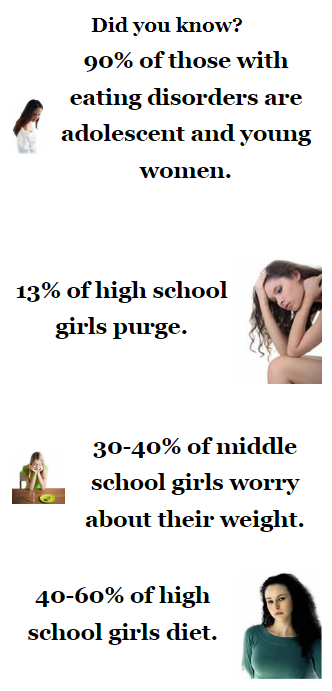Eating disorders are complex psychological illnesses that cause severe disturbances in eating behavior. The result can be devastating medical consequences and even death. In fact, anorexia nervosa is the deadliest of any psychiatric illness.
Anorexia Nervosa - persons with anorexia refuse to maintain a minimally normal body weight and have an intense fear of weight gain or becoming fat, even though they are underweight (DSM-IV, 1994).
Bulimia Nervosa - persons with bulimia nervosa have repeated episodes of binge eating followed by inappropriate compensatory behaviors such as self-induced vomiting, misuse of laxatives, fasting or excessive exercise (DSM-IV, 1994).
Binge Eating Disorder - impulsive gorging, grazing, binging and/or continuous eating, not in response to physical hunger, accompanied by a sense of lack of control. Eating is driven by emotions rather than hunger.
In anorexia and bulimia, the individual uses behaviors to prevent weight gain, such as restricting food intake, vomiting, laxatives, or exercise. With BED, there is an absence of compensatory behaviors to prevent weight gain after binging. The health consequences of BED are typically quite different than those of anorexia and bulimia. The health risks of BED are most commonly those associated with clinical obesity.

Some of the potential health consequences of BED include: · High blood pressure · High cholesterol levels · Heart disease · Diabetes mellitus · Gallbladder disease Emotional Consequences of BED: · Increasing self-hate · Intense feelings of guilt and shame · Hypersensitivity to others' perceptions · Mood swings · Feelings of worthlessness · Being a "people-pleaser".
People with eating disorders can be treated in a variety of settings: outpatient individual counseling, an intensive outpatient program (IOP) or day treatment program, or an inpatient residential treatment program.
The treatment setting depends on the severity of the illness. Severely underweight or medically compromised patients are almost always treated in a hospitalized setting. Since the introduction of managed care and changes in insurance reimbursement, the trend has shifted towards outpatient programs that incorporate group therapy and individual counseling for those patients who are medically stable. This allows patients to attend work or school while getting treatment. As a standard, we at MTC treat individuals according to the standards set by the American Psychiatric Association, in terms of level of severity and level of care.
The treatment team at MTC has been treating individuals with eating disorders in Gwinnett county for many years. They believe that a multidisciplinary approach is essential to successful treatment and recovery from an eating disorder.
This team approach includes a variety of professionals: psychologist, dietitian, physician, psychiatrist, counselors, and family members.
Additional Resources
Visit these site for more information:
- www.mannafund.org - Help for individuals who have life threatening eating disorders to gain access to intensive treatment when they otherwise could not afford it.
- www.talkitout.org - Manna Fund has created a website to support those going through eating disorder recovery.
- www.nationaleatingdisorders.org - Nationally-based organization regarding eating disorders information and connections.
- www.edreferral.com
- www.eatingdisorderhope.com - Vast amounts of information on eating disorders
- www.something-fishy.org

